Hezbollah is leaving itself exposed to Israel

Last week, Middle East Eye reported that Lebanese movement Hezbollah had been instructed by its patron Iran to suspend operations against Israel and to target Saudi Arabia instead.
The veracity of the report, which cited “well informed sources in Lebanon,” has been debated on social media. Time will tell, but Hezbollah’s uncharacteristic reaction to the killing in Damascus of its top military commander Mustafa Badreddine lends support to the claim.
Hezbollah did not point the finger at Israel, which has refused to comment on whether it was behind the killing, although it has assassinated, and been accused by the movement of assassinating, other Hezbollah figures in Syria. They include Samir Kantar and eight others in December, Jihad Mughniyeh and five others in January 2015, and Imad Mughniyeh in 2008 (not to mention figures assassinated in Lebanon).
Instead, the movement blamed “artillery bombardment carried out by takfiri groups” supported by Riyadh, without naming a particular group. MEE reported that “Hezbollah slogans at Badreddine’s funeral left little doubt that they held Saudi Arabia responsible”.
This despite no claim of responsibility from any party, and MEE reporting that “the nearest opposition artillery positions… were 20 kilometres away, and there are doubts that their shells could achieve pinpoint accuracy from that distance.”
Hezbollah’s change in tack may be designed as a casus belli to target Saudi Arabia or Saudi interests. It may also, or instead, be designed to save face, because blaming Israel would raise threats and expectations of retaliation, which Hezbollah would be hard pressed to carry out given its deepening involvement in the Syrian conflict.
Retaliating would carry grave risks for its overstretched military against the region’s most powerful army, but not doing so would make Hezbollah look weak against a sworn enemy. Far more expedient, then, to blame forces against which it is already fighting.
Where Iran is concerned, the chances of Israeli air strikes against it have receded since last year’s nuclear deal, not because Israel is happy with it (on the contrary), but because it would infuriate crucial allies that were instrumental in the deal.
Meanwhile, Saudi-Iranian tensions continue to heighten, and the threat posed by Syrian rebels has increased given Tehran’s deepening involvement on the ground in Syria, which has resulted in rising Iranian fatalities, including senior military figures.
As such, despite all the usual bluster against Israel, Iran and Hezbollah view Syrian rebels and Saudi Arabia – which has vowed to increase support for them if Damascus continues its diplomatic intransigence – as a bigger direct threat at the present time.
Neither Tehran nor Hezbollah will ever admit this, or acknowledge a focus on Saudi Arabia instead of Israel if that has been decided, because it would undermine their self-styled image as part of an “axis of resistance” against Israel. Nonetheless, the aforementioned considerations mean that a decision to target Saudi Arabia rather than Israel, at least for the time being, is not far-fetched.
These developments highlight the extent to which Hezbollah has limited its options vis-a-vis Israel because of its involvement in Syria, which represents a deepening quagmire for the movement with no end in sight. Not that Hezbollah is trying to extricate itself from it – quite the contrary.
Following Badreddine’s killing – described by Reuters as “one of the biggest blows yet to the Iranian-backed group’s leadership” – Hezbollah chief Hassan Nasrallah vowed to strengthen its presence in Syria and send more leaders there.
However, this risks spreading the movement thin. It has already sent thousands of fighters to Syria, and Nasrallah acknowledged a year ago that Hezbollah was fighting throughout the country rather than in certain areas, as previously claimed.
Sending more fighters there will also inevitably lead to more casualties. Nasrallah admitted last week that Hezbollah had lost “a large number” of fighters in Syria. Estimates of fatalities range from 1,200 to 2,000, including prominent figures, and it was reported in December that some 5,000 fighters had been injured.
Hezbollah’s death toll so far from the Syrian conflict dwarfs that from its 2006 war with Israel, which ranged from 250 according to the movement, to 600 according to the Israeli army. With Hezbollah bogged down in Syria, it has left itself dangerously exposed to Israel, which is no stranger to sabre-rattling against it.
Should Israel decide to act against Hezbollah in Lebanon or Syria – either by individual operations, general escalation or full-blown war – it would do so in the knowledge that the movement cannot feasibly fight on two fronts, and that its domestic and regional popularity has nose-dived due to its intervention in Syria. These facts might tempt Israel, which has thus far never managed to defeat Hezbollah.
The movement has strayed from its legitimate raison d’etre of resisting Israeli aggression, instead focusing on supporting a dictator in brutally oppressing his own people. However, it is Israel, not Syrian rebels, that poses an existential threat to Hezbollah – the movement is forgetting that at its peril.
- Sharif Nashashibi is an award-winning journalist and analyst on Arab affairs. He is a regular contributor to Al Arabiya News, Al Jazeera English, The National, and The Middle East magazine. In 2008, he received an award from the International Media Council "for both facilitating and producing consistently balanced reporting" on the Middle East.
The views expressed in this article belong to the author and do not necessarily reflect the editorial policy of Middle East Eye.
Photo: A supporter of Lebanese Shia militant group Hezbollah shows a portrait of its slain commander Mustafa Badreddine during a memorial ceremony to mark a week since he was killed in an artillery attack near Damascus, on 20 May, 2016 in a southern suburb of the capital Beirut (AFP).
New MEE newsletter: Jerusalem Dispatch
Sign up to get the latest insights and analysis on Israel-Palestine, alongside Turkey Unpacked and other MEE newsletters
Middle East Eye delivers independent and unrivalled coverage and analysis of the Middle East, North Africa and beyond. To learn more about republishing this content and the associated fees, please fill out this form. More about MEE can be found here.





